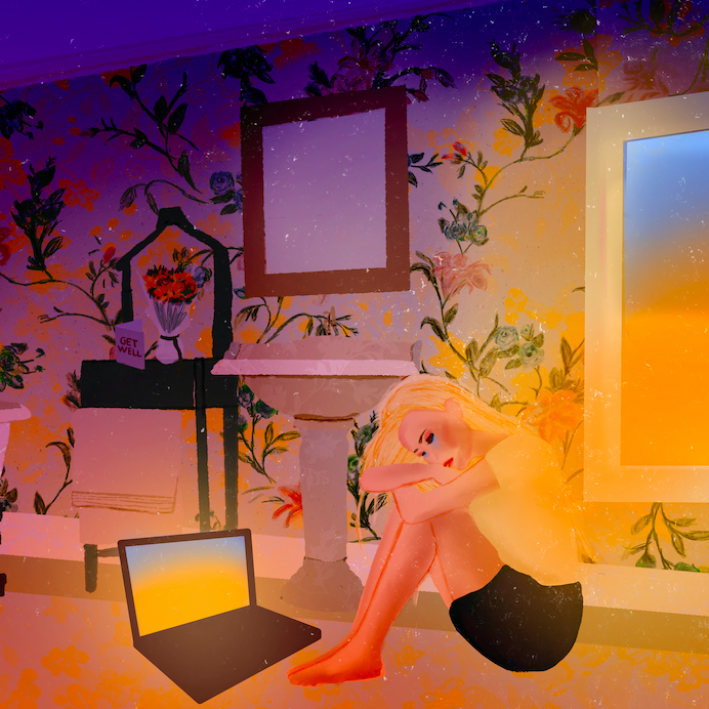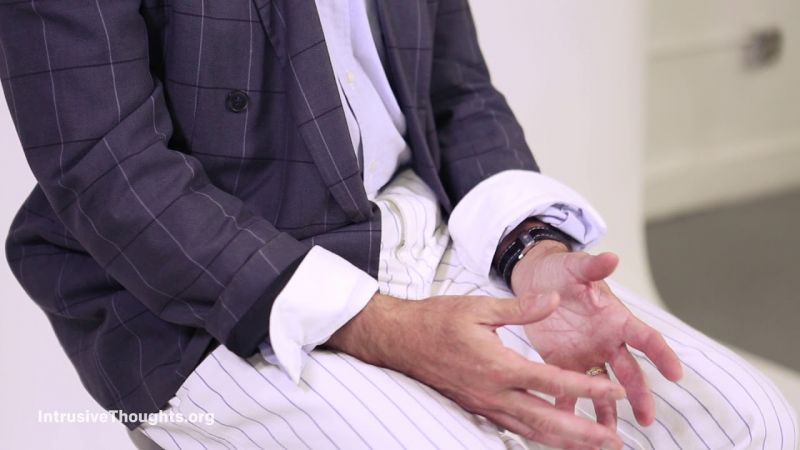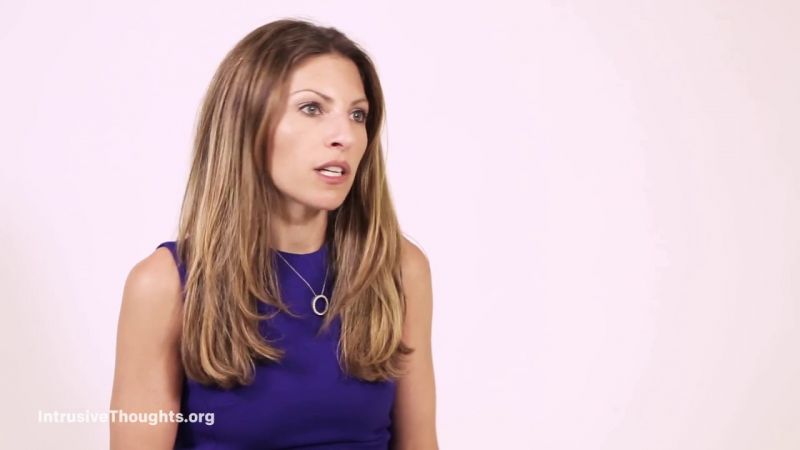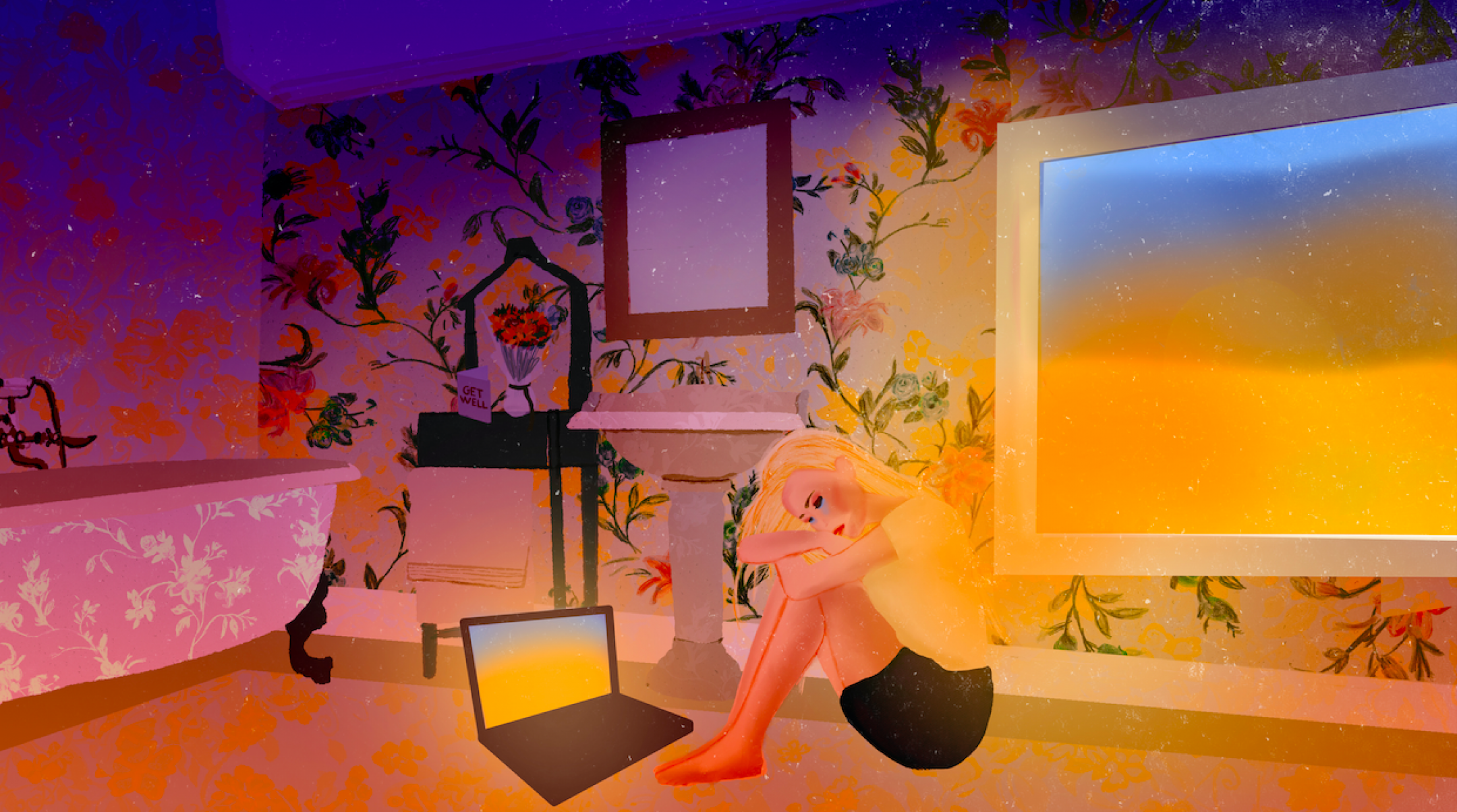Work From Home or Work From Health?
An example of a workplace that cares about your mental health.
Written by Sarah McKinnon

01 Sarah was struggling with Harm OCD when she decided to take time off work to focus on her mental health.
02 To her surprise, her workplace supported her through her medical absence, which allowed her time to rest and heal.
03 After her successful absence, she explains why workplaces can benefit from providing mental health support to their employees.
Trigger warning: Mentions of suicidal ideation
It should have been just another average Tuesday. A workday where I motion through my usual morning routine — rise in the morning, comb through a to-do list, make a cappuccino, open my laptop to the remote world.
Instead, I was rising off of the bathroom floor in all-too familiar discomfort after blacking out from yet another panic attack. My head was pounding, my neck hurt from being awkwardly wedged against the floor and sink base, and my left hand was twisted and numb under my face. I could faintly smell bleach on the tiles, which triggered flashbacks to dark times that seemed to be happening again.
I accidentally cried right through my first work meeting of the day. When I eventually got online, I apologized, lied, and said my computer was just having trouble. Through the years, I was trained to not say “sick”, and even more trained to not mention mental health.

What is Harm OCD?
Over a year prior, I had a plan to take my life on Christmas Eve because the new twists of my Harm Obsessive Compulsive Disorder were torturous beyond comparison. Fortunately, I was unsuccessful, but it seemed like I had lost a piece of myself. I even asked my parents to not sing happy birthday to me, which was a mere three days later, as I didn’t want to be reminded of that particular day every year. I remember laying in bed with a cold rag on my face, tearfully staring at my bedside table that had my birthday cake, unlit candles, and a bottle of unopened champagne. It was my twenty-first birthday. Life should have been starting, but mine seemed to be ending.
A few days after that, I returned to work (at my now previous company) with a smile on my face. Everyone bubbled with holiday euphoria while I bubbled with anxiety, knowing I had weeks of rigorous intensive therapy ahead. So, I applied extra concealer, had three coffees a day, and brought an energy level to the workplace that my therapist later described as “manic-like.”
I would take the latest appointment times with therapists and doctors, as it was typical for my job to run late. Then, I would rush to my therapy appointment that would usually end in me dry-heaving in the toilet in fear, as ERP treatments can be very challenging. I would then go back to my lonely apartment, eat cold takeout in bed around midnight, sleep, and repeat the cycle. While I had the highest performance of my early career and was congratulated during the day, I slowly withered away at night.
I was too afraid to tell my bosses I needed a break. Revealing mental health struggles usually means shattering people’s perception of you. Poor training can often cause managers to mistake someone with a disorder as someone who is unable to handle more responsibility, but this is not true. We are just like anyone else who may have had surgery, physical treatment, or medication. Sometimes we just need time, and like any other person, breaks.
However, as a young person in their twenties navigating our modern world, career climbing was a default goal. Having a “hustle attitude” was a necessity on resumes next to knowing how to use Microsoft Word. This attitude left little room for failure, and even less room for mental health.
Despite having OCD and severe generalized anxiety my entire life, they hardly get acknowledged as medical conditions. After walking with mental disorders long enough, you just accept the reality that you must power through and carry the weight daily.

OCD & Work
Consequently, things got worse. My hands would shake as I opened my laptop every day, and my eyes were blurry from weeks of getting minimal sleep. I was exhausted by nightmares and sleep paralysis. I had intrusive thoughts about suicide that repeated every few minutes. My high stress was also causing physical ailments, and I was often in physical pain and couldn’t eat properly. Some days, I couldn’t be left alone. My performance at work dropped off the deep end, and I had gone with it.
My coworker, who I confided in about my mental health, said I should take a medical leave. “But I thought medical leave was for real medical problems, like a broken hand or something?” She blinked, “Sarah. Are your OCD, panic attacks, anxiety and depression not real?”
Days later, I aligned with my therapists and went through a flawless paperwork process at work thanks to the wonderful women in my HR department. Before I knew it, my messages went silent and I was on leave. It felt too good to be true.
My job encouraged me to take the time I needed and didn’t rush my return. Although my leave was a lot of hard work and I was often bedridden, my body started healing. Healing. I was not just “powering through” anymore. Instead, I was powering toward strength.
A week before coming back to work, I mentally prepared myself to be fired. I thought, “Something has to go wrong. They’re not going to want me now that they've seen how broken I am.” Yet upon my return, everyone treated me normally. Our HR Department sent me additional resources, and coworker friends checked in to see how I was feeling. My immediate supervisors set up appointments that were all about success, and another coworker stepped in to help support me as I acclimated back into the fast-paced working environment.
I was stunned that even in this digital space, with people I had never met in person, my mental health absence was taken just as seriously as any other medical absence. I cried tears of joy because for the first time in my life, physical and mental health were treated as equals — an equality I had never encountered before.
I know I am one of the lucky ones, but this leave was only the tip of the iceberg. My company offers a handful of free resources, from the meditation app Headspace to free licensed counseling for employees and their family members. They’ve even found a creative way to encourage people to practice healthy behaviors via GivHero, which results in company donations. It’s also not uncommon to receive an email from our Executives who encourage employees to have extended holidays, establish meeting boundaries, and take mental health days.

To anyone who is struggling with mental health: You deserve to have options in the workplace. You don’t have to settle, and you don't have to suffer. There are companies and workplaces — even during the pandemic and rise of remote work — that will value your mental health. I am fortunate enough to be working at one of them.
As the Art Director for AREA 23, a healthcare advertising agency that is a part of the global network of IPG Health, I can attest that they actually care about the mental health of their employees. I’d like to share this in hopes that it will help you realize that “powering through” is not your only option.
To managers or executives: You will benefit beyond what you can imagine by investing time and money into mental health resources. A neurodiverse employee is just as capable as any other employee. In fact, many people with mental health conditions have a deep understanding of human connection, and they bring unique thought processes into their work and projects.
You're not investing in just a resource on paper, you’re investing in the lives of others. No matter how big or small your business is, this has macro implications. Companies of any size have the power to implement mental health resources and benefits that not only retain employment, but also save lives.
<>
ABOUT THE AUTHOR
Sarah McKinnon, Art Director at AREA 23 and Mental Health Activist
Support our work
We’re on a mission to change how the world perceives mental health.



















